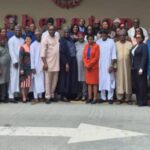NBS assures of improved statistical system to enhance development
By Isaiah Eke
The National Bureau of Statistics (NBS) has given assurance of building a stronger and more vibrant statistical system that will ensure economic development of the country.
The Statistician-General of the Federation, Mr Adeyemi Adeniran, disclosed this in his keynote address at a two – day Southern States Stakeholders’ Workshop on “Production of National Strategy for Development of Statistics Phase Three” in Uyo, Akwa Ibom on Monday.
Adeniran said that it was imperative to forge a robust strategy to guide the growth and development of the system that would be responsible for producing the data that the country would depend on.
“Over the past couple of months, NBS, in line with its role and position as the Coordinator of the Statistical System in Nigeria has been working tirelessly on the process of developing a new National Strategy for the Development of Statistics (NSDS) in Nigeria.
“Statistics, often hailed as the ‘silent language of governance,’ form the bedrock of an informed and thriving society.
“They guide policy formulation, resource allocation, and progress evaluation.
“As we convene today for this crucial task, let us recognise that statistics go beyond mere numbers; they articulate the narrative of the situation in society, inform decisions, policies, and programmes, and pave the way for a brighter future.
“The accuracy and quality of our statistics are paramount. We must continuously strive for excellence in data collection, analysis, and dissemination to maintain the trust and confidence of our data users and policymakers.
“The quality of the output, the soundness of methodology and processes, and the robustness of our data sources are extremely vital and require due attention under this new strategy.
“We will continue to work together to build a stronger and more vibrant statistical system that is capable and well-resourced to produce and facilitate the use of data in our progress toward sustainable development.
“By doing so, we will fulfil our mandate and contribute to a data-driven, progressive, and economically viable Nigeria that works for the benefit of all our citizens,” Adeniran said.
Adeniran said that NBS would foster collaborations with local and international organisations, academia, and the private sector, to access resources, knowledge, and technical assistance and advance the nation’s statistical system.
In his remarks, Gov. Umo Eno of Akwa Ibom commended the NBS for their efforts to modernise the statistical system at all levels in the country.
Eno, who was represented by the Commissioner for Economic Development, Mr Emem Bob, said that such efforts would enable the production of official statistics that all stakeholders would rely on for their respective programmes and projects.
The governor, who declared the event open, urged all participants to contribute diligently to the new NSDS, to address gaps and challenges hindering the production of unified data that would accurately reflect current emerging realities in the country.
Earlier in his welcome remarks, the State Director of Statistics, Mr Peter Akpan said that in the present era of data, the official statistics were indispensable for effective governance and development.
Akpan said that it was necessary to modernise the state and national statistical system in a way that would reflect the internationally recognised framework.
The News Agency of Nigeria (NAN) reports that the theme of the workshop is: ” To Assess the National Statistical System (NSS) Harness Inputs and Proffer Recommendations for the Development of NSDS in Nigeria”. (NAN)(www.nannews.ng)
Edited by Edith Bolokor/Chioma Ugboma
Published By
Has also recently published
 Economy/BusinessJuly 3, 2025Jason Miller outlines Trump’s Africa trade vision
Economy/BusinessJuly 3, 2025Jason Miller outlines Trump’s Africa trade vision General NewsJuly 3, 2025Structured finance evolving to meet Africa’s changing economic landscape – Oramah
General NewsJuly 3, 2025Structured finance evolving to meet Africa’s changing economic landscape – Oramah HealthJuly 3, 2025Lawmakers call for end to foreign dependencies in health financing
HealthJuly 3, 2025Lawmakers call for end to foreign dependencies in health financing Culture & TourismJuly 3, 2025Don calls for investment in tourism to reduce oil dependency, boost economy
Culture & TourismJuly 3, 2025Don calls for investment in tourism to reduce oil dependency, boost economy





